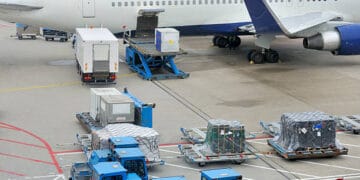As air cargo demand stabilizes and capacity increases, shippers are taking the opportunity to reevaluate their air cargo agreements, especially as air freight rates begin to decline, according to industry executives. In the wake of a capacity-constrained market during the COVID-19 pandemic, which favored air carriers, shippers are now in a stronger position to negotiate rates, as mentioned by Jan Kleine-Lasthues, COO of Airfreight at Hellmann Worldwide Logistics. Kleine-Lasthues anticipates that more Request for Quotations (RFQs) will be issued by shippers seeking to lock in the current low rate levels for extended periods, possibly resulting in contract agreements spanning six to 12 months.
He also highlighted that industries such as automotive and pharmaceuticals are particularly interested in longer-term agreements. Geodis, as customer contracts based on previous rate levels expire, is advising shippers to consider long-term pricing agreements with fluctuating fuel charges, according to Eric Martin-Neuville, EVP of Freight Forwarding at the company. Martin-Neuville emphasized that the time is right for shippers to enhance the resilience and robustness of their supply chains. Clive Data Services, part of Xeneta, reported that during the second quarter, freight forwarders, feeling constrained by high airfreight rates and capacity constraints, observed a growing number of shippers launching tenders and negotiating lower rates for six-month or longer contracts.
In light of evolving market conditions, maintaining strong long-term relationships with carriers is crucial for shippers, particularly as capacity remains critical on certain trade routes, noted Peter Penseel, COO of air freight at CEVA Logistics. He stressed the importance of prioritizing long-term stability and trust over short-term gains in a volatile air freight market. Airfreight rates have been decreasing due to lower demand and increased capacity, with general spot rates down 41% YoY in July. Penseel expects rates to continue their global decline, albeit with some exceptions on specific routes. While peak season demand traditionally leads to rate spikes and the need for capacity, the industry does not anticipate a strong peak this year, or at most, a mini-peak, according to Penseel.
Market dynamics have prompted industry players to reevaluate their post-pandemic air freight strategies, particularly in response to easing ocean disruptions. After the 2021 capacity crunch and surging demand, many carriers and logistics providers are now adjusting their aggressive expansion plans. For example, Amazon scaled back its air network operated through Air Transport Services Group, and FedEx downsized its Express unit to optimize its air network earlier this year.
Get the newest updates in supply chain logistics news on The Supply Chain Report. Visit ADAMftd.com for free international trade tools.
#AirCargoDemand #AirFreightRates #LogisticsAgreements #CapacityIncrease #ShippersNegotiation #LongTermContracts #AirfreightMarket #Geodis #HellmannWorldwideLogistics #CliveDataServices #Xeneta #CEVALogistics #FreightForwarding #SupplyChainResilience #AmazonAirCargo #FedExExpress #LogisticsTrends #SupplyChainStrategies #AirCargoIndustry #AirfreightEvolution #PostPandemicFreight















